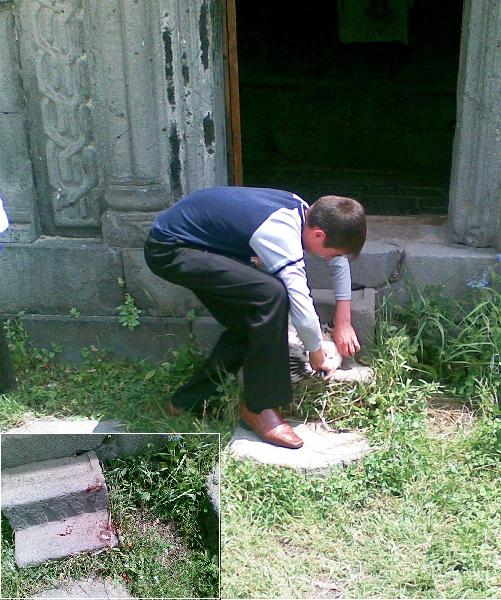Matagh (Animal Sacrifice) - Armenia 2009.JPG on:
[Wikipedia]
[Google]
[Amazon]
 In Armenian Christian tradition, matagh ( hy, մատաղ ''mataġ'') is a lamb or a rooster slated for slaughter as thanksgiving to God, a
In Armenian Christian tradition, matagh ( hy, մատաղ ''mataġ'') is a lamb or a rooster slated for slaughter as thanksgiving to God, a
practice
Practice or practise may refer to:
Education and learning
* Practice (learning method), a method of learning by repetition
* Phantom practice, phenomenon in which a person's abilities continue to improve, even without practicing
* Practice-based ...
which has continued from Armenia's past. In many regions of Armenia today, this practice is very much alive in the regular slaughter of chosen animals in front of churches.
Matagh is done often to ask God for either forgiveness
Forgiveness, in a psychological sense, is the intentional and voluntary process by which one who may initially feel victimized or wronged, goes through a change in feelings and attitude regarding a given offender, and overcomes the impact of th ...
, health, or to give him something in return. People generally gather at the house where the Matagh was done, where they pray and eat the meat. Tradition holds that the meat must be eaten before sundown and for any salt to be used to be blessed.
While commonly misinterpreted to be a sacrifice for the remission of sins, it does not derive from the practice of atonement through animal sacrifice
Animal sacrifice is the ritual killing and offering of one or more animals, usually as part of a religious ritual or to appease or maintain favour with a deity. Animal sacrifices were common throughout Europe and the Ancient Near East until the spr ...
as in the Old Testament
The Old Testament (often abbreviated OT) is the first division of the Christian biblical canon, which is based primarily upon the 24 books of the Hebrew Bible or Tanakh, a collection of ancient religious Hebrew writings by the Israelites. The ...
of the Bible. As Fr. Vazken Movsesian states, Matagh is "not a magical incantation, and the Armenian Church does not condone that kind of thing. ... We don't sell protection." Most Armenians consider it a simple recognition of thanks to God and to give food and alms to the poor and needy, as a means of "paying it forward." Many describe it as simply being like any other festal meal given through the Church.
The meat is to be prepared in a simple way stove top (usually Khashlama) with minimal spices. It is not to be grilled over a fire. Also the meat is supposed to be shared among 7 families (relatives and/or neighbors). In many cases a Matagh takes place as an act of thanksgiving to God after an accident or other life-threatening event with a good outcome.
See also
* MadaghReferences
{{Cuisine of Armenia Animal sacrifice Armenian cuisine Traditional meat processing